Finding Myself in Cape Town January 04, 2024
By Nikita M (Anthropology, Brandeis University) - abroad from 08/25/2023 to 12/07/2023 with
SIT Study Abroad: South Africa - Multiculturalism and Human Rights
Not only did I learn a lot about the history of colonialism in South Africa, but I also learned so much about myself. I feel much more confident in who I am now and that was entirely shaped by the conversations I had with the people there. They all offered me so much insight and clarity on my personal path.
Review Photos
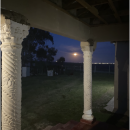
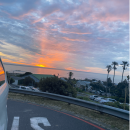
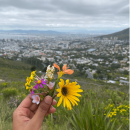
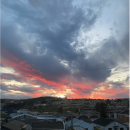
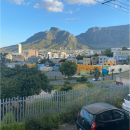
Personal Information
| How much international exposure did you have prior to this program? | 6 months+ |
Review Your Program
|
* Overall educational experience
Academic rigor, intensity, resources, etc. |
I think typically students who participate in this program might not have a lot of experience with decolonial thought/race/gender studies, so I often found some of the material to be repetitive especially given that majority of my classmates have had that experience as well. That being said, getting a South African perspective was really invaluable and the educational excursions we went on were definitely the highlight of my academic experience. |
|
* Host Country Program Administration
On-site administration of your program |
Honestly, I did not have many issues so I did not have much interaction with the administration that could have been negative. However, I think there was a lack of timely communication (i.e. what we were doing on a weekly basis) that could be improved. Despite this, I really enjoyed the flexibility of the program and the fact that time was not always concretely planned. |
|
* Housing:
How satisfied were you with your living arrangements? |
Please only do this program if you are very adaptable and can live under vastly different living situations that are not always compatible with the lifestyles we tend to live in the US. There is a two week period in the village where you will be using an outhouse for the bathroom and a basin and bucket of water to bathe. If you keep an open mind like I feel as though I did, you will not have any problems. I loved my four host families deeply and still keep in contact with them. The hostel we stayed at towards the end did not have an oven which was inconvenient, but it's easy to find ways around what I would consider to be minor inconveniences. |
| * Food: |
My host families had amazing food. South Africa (and more specifically amaXhosa people) is a meat dominated culture, so I would keep that in mind if you have dietary restrictions. It is possible to be vegetarian, etc., but it can make for awkward conversations with families because most people they know consume meat products. I do not think the stipend was enough to cover lunch everday and often had to spend a couple of rand out of pocket. The stipend placed us as middle class South Africans, but it was difficult to sustain that money with inflation that was occurring while I was there. |
|
* Social & Cultural Integration:
How integrated did you feel with the local culture? |
I think this is very dependent on each person, but for me I am a very extroverted person who does not mind talking to strangers. I really pushed myself out of my comfort zone and tried to mostly engage with South Africans and other Africans. I would suggest traveling in groups of 2-4 (if you decide to hang out with people in your program) because it makes you much more approachable and less obnoxious as an American. Staying with the host families also created an environment where social and cultural integration was much easier. |
|
* Health Care:
How well were health issues addressed during the program? |
N/A, I did not have any healthcare experiences or any health issues while I was abroad. |
| * Safety: |
Cape Town has a very large pickpocketing/robbing issue. I would not being any jewelry/accessories that look expensive. Always keep your phone away when you are walking in the street, and once I was comfortable navigating, I often left my phone at home. As a non-white student, I was at an advantage because many people thought I was South African and would not mess with me, therefore, I tried not to speak too loudly in the streets to keep up that illusion. Keep your head on a swivel and stay vigilant, just like you should everywhere you are. Any place is dangerous, so just don't put yourself in dangerous positions (ie walking home alone at night). |
| If you could do it all over again would you choose the same program? |
Yes
My experience was overwhelmingly positive. Yes, the topics were heavy and required a lot of critical analysis of society, but that is what I am genuinely interested in. I met some of the most amazing people in my life who I will be staying in contact with, both in the program itself and in South Africa as well. I would also mention that while staying in Langa specifically, there is restriction of movement once you get into the township, but I would implore students to think about why that is and how that is a direct result of Apartheid. I know it is really difficult because you want to be able to go out and do what you want, but the people who live there do not necessarily have access to that leisure. It is only for three weeks and it gives you a lot of time to spend with your host family which is most important. |
Finances
|
* Money: How easily were you able to live on a student's budget?
(1 = not very easy/$200+ on food & personal expenses/week, 2.5 = $100/week, 5 = very easily/minimal cost) |
As a student on scholarship who is also a full time employee, I really wanted to have the best experience, so I personally saved up a lot of money to spend on this trip. Therefore, I did not have to budget that much or really worry about money. I think I spent more than a typical student would, but I would say it is generally easy to keep personal costs down because currency is in favor of the US dollar. I think the food stipend could have been higher though so I would not have had to spend so much money on food (which is meant to be provided by the program). |
| Not including program expenses, about how much money did you spend on food and other expenses each week? | $150 |
| Do you have any general money-saving tips for future study abroad participants? | Prioritize spending your money on experiences and not material objects. You will remember those experiences forever and they can be cheaper than buying clothes, etc. |
Language
| * Did your program have a foreign language component? | Yes |
|
How much did the program encourage you to use the language?
0 = No encouragement, 5 = frequent encouragement to use the language |
I think this is also dependent on you. I tried to uses isiXhosa as much as I could with as many people as I could, so I would say that I improved quickly. On the other hand, it is really easy to not use the language at all because everyone speaks English. Thankfully, my first two host families who were amaXhosa really encouraged me to use Xhosa and would often help me with my homework. |
| How would you rate your language skills at the beginning of the program? | None |
| How would you rate your language skills at the end of the program? | Beginner |
| How many hours per day did you use the language? | |
| Do you have any tips/advice on the best ways to practice the language for future study abroad participants? | Speak with your host families in Xhosa as much as you can. There should be no embarrassment because people are just really excited that you are taking the time to learn their language. Listen to the conversations that are happening around you, it is really cool when you realize that you understand bits and pieces of what they are saying. |
Other Program Information
|
* Where did you live?
Select all that apply |
|
|
* Who did you live with?
Select all that apply |
|
|
* Who did you take classes with?
Select all that apply |
|
| About how many local friends did you make that you will likely keep in touch with? |
A Look Back
| * What did you like most about the program? |
|
| * What could be improved? |
|
| * What do you know now that you wish you knew before going on this program? | When you first go for a fall program, South Africa is ending winter so it is cold. Bring a puffer or something. Some days will be randomly warm, cue spring weather, but in the beginning it is just cold for the most part. There is a lot of opportunity to go out on your own, especially in November, so bring clothes you want to wear out. Capetonians are really stylish, so if you like fashion, bring your best fits. Although you are moving around a lot, it's not too difficult to carry things so you can really pack as much as you want. There is storage space in the SIT classroom that you can leave stuff if you don't want to carry it from homestay to homestay. |
Reasons For Studying Abroad
| To help future students find programs attended by like-minded individuals, please choose the profile that most closely represents you. |
The Outright UrbaniteA social butterfly, you're happiest in bustling cities with hip people, and took advantage of all it had to offer. You enjoyed the nightlife, and had fun going out dancing, and socializing with friends. Fun-loving and dressed to the nines, you enjoyed discovering new restaurants, shops, cafes, and bars in your host country. |








